Timothy Tye's journey: preserving Penang Hokkien through an online dictionary

I am filled with immense pride to witness the presence of unsung heroes in Penang, individuals driven by a shared belief in uplifting their community. Among them stands Timothy Tye, a beacon of inspiration. Since its inception on 5 January 2003, his Penang Travel Tips website has provided invaluable information on Penang (now extended to cover Malaysia as well as Singapore). Timothy is not only a prominent foodie and YouTuber but is also a passionate advocate for the preservation of Penang Hokkien.
With unwavering determination, Timothy embarked on an extraordinary journey, driven by his deep-rooted love for Penang Hokkien. He is the proud creator of the online Penang Hokkien dictionary. Breaking free from traditional print dictionaries, Timothy's decision to develop an online dictionary was to reach a global audience. This digital platform allows him to share his wealth of knowledge with individuals across the globe, free of charge. To further support learners, he has also established the "Learn Penang Hokkien" YouTube channel, extending his assistance to those eager to embrace this captivating dialect.
His passion for Penang Hokkien
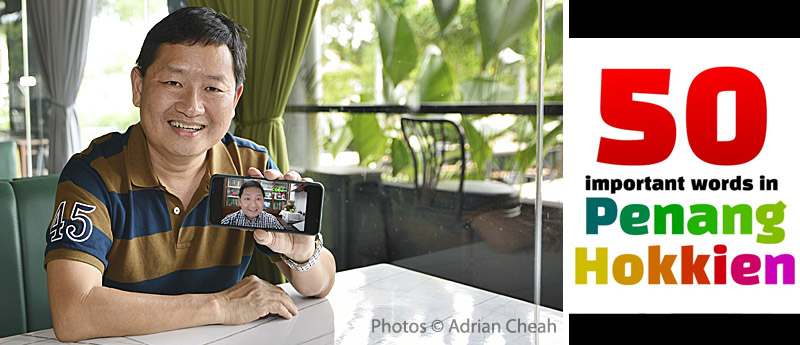
In Timothy's heart, a spark ignited when he realised a missing piece in his extensive website Penang Travel Tips. Despite its comprehensive coverage of Penang, it lacked a profound connection to his own mother tongue, Penang Hokkien. This revelation stirred within him an insatiable desire to rectify the omission, to preserve and perpetuate the dialect.
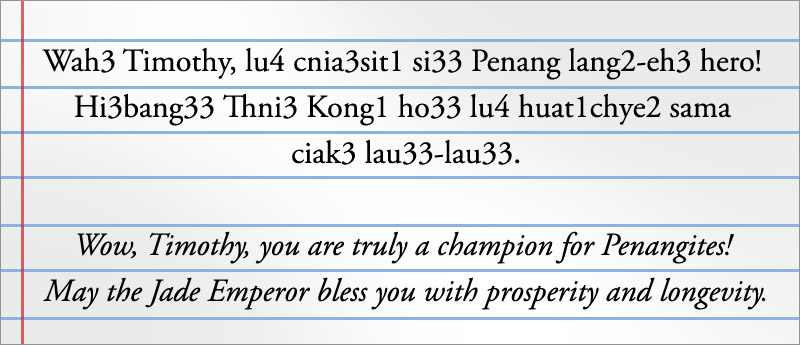
Timothy's motivation was fueled by his own need for a user-friendly dictionary that displayed Penang Hokkien words using the Taiji Romanisation system. It has retained the spelling of words but with added tone numbers corresponding to the four tones in Mandarin. It uses tone numbers instead of diacritic marks so that people can easily type out the words on a computer or a smartphone. Timothy, nevertheless, wanted to provide a comprehensive resource that would cater to different preferences, incorporating various writing systems and Chinese characters. By including all four writing systems (Taiji Romanisation, Taiwanese Romanisation, Church Romanisation and Chinese characters), Timothy aimed to ensure that anyone familiar with any of them could easily use the dictionary for cross-referencing. The dictionary currently has over 6,000 words and counting.

When I saw "The Professor and the Madman", I was mesmerised by the captivating tale of editor Sir James Murray and American surgeon William Chester Minor. Their life struggles converged as they found solace in building the Oxford English Dictionary (OED). While they never witnessed its publication, their remarkable work immortalised them through the very words they cherished. The movie was based on the 1998 non-fiction book, "The Surgeon of Crowthorne" by Simon Winchester.
Today, the OED stands as one of the most comprehensive and authoritative dictionaries for the English language, encompassing approximately 600,000 entries. In the realm of Chinese dictionaries, the Hanyu Da Cidian (汉语大词典) reigns as a remarkable achievement, boasting over 370,000 entries. Timothy's own dictionary currently holds over 6,000 words and I hope that is enough to contribute to the growth of the written form of Penang Hokkien – to ensure that Hokkien stories can travel through the passage of time and avoid fading into oblivion.
Standardising spelling and developing a writing system
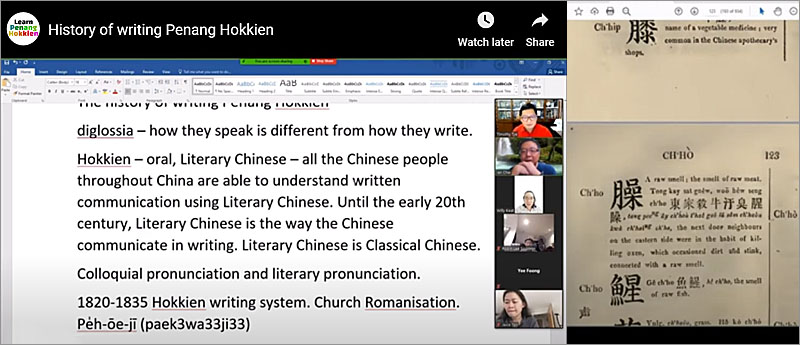
To address this challenge, Timothy understood the importance of establishing a standardised spelling for Penang Hokkien words. He delved into linguistic terms and concepts, educating himself about voiced consonants, aspirations, glottal stops, tone classes, tone sandhi and more. Armed with this knowledge, he set out to create the dictionary hand-in-hand with developing a new writing system for Penang Hokkien.
During his journey, Timothy looked at the origins of Hokkien and the linguistic landscape of China. He discovered that Hokkien and Mandarin were languages rooted with own distinct rich history. He also learnt about the influence of Christian missionaries (arriving in Malacca, before moving to Penang, Singapore and then onwards to China) who developed Church Romanisation created in the first half of the 19th century. The missionaries created this writing system because they discovered that the local Chinese in the Malay archipelago were largely illiterate.
Challenges and critiques
As an English-educated individual without formal linguistic training, Timothy faced obstacles and encountered criticism from some linguists. However, he remained undeterred, firmly believing that preserving Penang Hokkien was not just an academic pursuit but also a mission of cultural importance. He recognised the creolised nature of Penang Hokkien, influenced by neighbouring languages and understood the need for it to evolve and modernise to thrive in a changing world.
Collaboration

Throughout his journey, Timothy actively engaged with the Learn Penang Hokkien Facebook Group (currently with about 18,000 members) and crowdsourced contributions to ensure the dictionary's accuracy and authenticity. Discussions, polls and inputs from fellow members enriched the entries, making the dictionary a true representation of Penang Hokkien. Timothy recognised and appreciated the invaluable contributions of group members, both local and abroad.
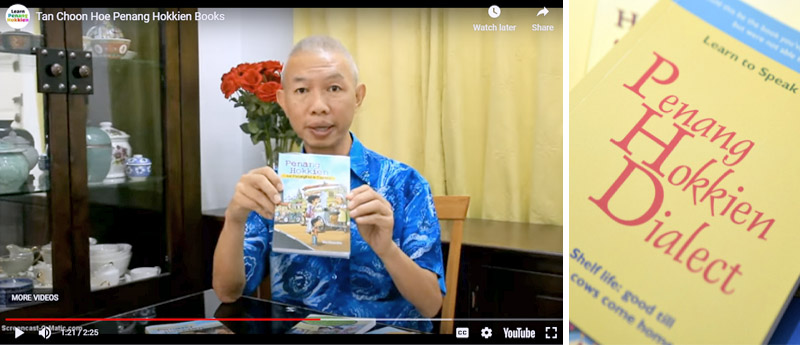
Initially when Timothy had the idea to create the Penang Hokkien dictionary in 2013, he sought the guidance and collaboration of Tan Choon Hoe, the author of "Learn to Speak... Penang Hokkien Dialect". Like Timothy, Choon Hoe had then made it his mission to preserve and document this uniquely Penang dialect as well as to educate and teach others how to speak it. Choon Hoe is among the few authors who wrote books on Penang Hokkien for the public. His inaugural publication in 2001 marked the beginning of a remarkable journey, followed by the creation of three subsequent volumes that echoed his dedication to the cause. Besides Choon Hoe, Timothy is also grateful to other authors for their support including Raymond Kwok and Johny Chee Boon Heng.
Tee Joo Tatt, the skilled programmer behind the Search Box feature in the online dictionary, played a pivotal role in enhancing the user experience. Thanks to his expertise, the search function has become incredibly user-friendly, allowing individuals to navigate the dictionary with ease.
Promoting and expanding its reach

Looking towards the future, Timothy aspires to expand his reach and promote the use of Penang Hokkien, especially among the younger generation. He plans to create more YouTube videos and conduct regular Zoom sessions to teach the writing system and familiarise people with the language. Additionally, he hopes to collaborate with content creators to expose Penang Hokkien to wider audiences, encouraging creative expression in the dialect.

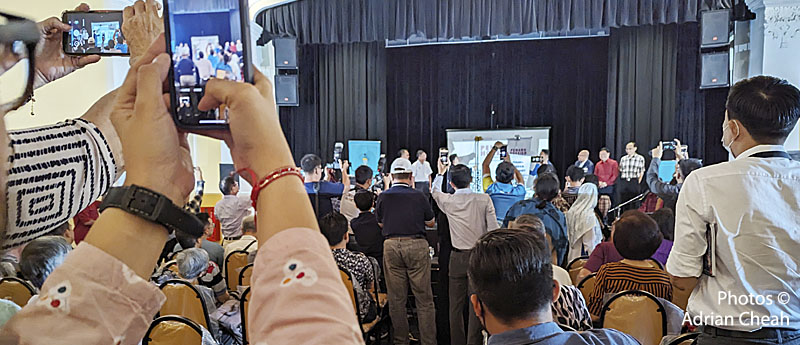
Timothy's work has garnered significant interest and support from Penangites and Penang expatriates longing for a connection to their homeland. His belief in the value of the dialect and heritage resonates deeply with individuals who share his passion. The endorsement of the new writing system by the Penang State Government serves as testimony to the impact of his endeavours and stands as a significant milestone in his pursuit of preserving and promoting Penang Hokkien. On 5 July 2023, the "Penang Hokkien – Our Language, Our Heritage" forum was held at Penang Town Hall to a packed house. Timothy's Penang Hokkien Dictionary and Learn Penang Hokkien YouTube Channel were also launched by Penang chief minister Chow Kon Yeow at the event, marking a significant stride forward.
Timothy's journey illustrates the power of individual passion and its impact on preserving and promoting a dialect and cultural heritage. Through his remarkable dedication, he has created an online Penang Hokkien dictionary that serves as a valuable resource for language learners and enthusiasts worldwide. His vision to establish Penang Hokkien as a unique entity, distinct from other variants, has contributed to the dialect's endurance and evolution in a rapidly changing world. With Timothy's efforts, Penang Hokkien stands a chance of thriving and preserving its unique identity for future generations.
PS: Ah Hoe eh1 cheak3 ha1ku4 cin1 la1ku2. Ta3pi1 tong3kim1 cin3cnia1 khan3khor4 choay33. MPH ti1 Penang pun1 sau1tong1 liau4-lo4.
(PS: Choon Hoe's books were once very popular. But now, they are difficult to come by. Even MPH in Penang has already shut down.)
-------------------------------------

Penang Hokkien Dictionary: https://www.penang-traveltips.com/dictionary/index.htm
Learn Penang Hokkien YouTube channel: https://m.youtube.com/c/learnpenanghokkien
-------------------------------------
Written and photographed by Adrian Cheah
© All rights reserved
5 July 2023